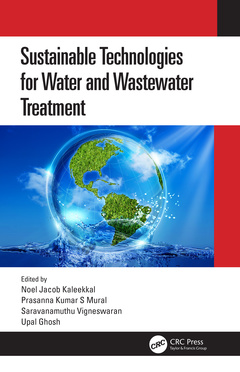Description
Sustainable Technologies for Water and Wastewater Treatment
Coordinators: Kaleekkal Noel Jacob, Mural Prasanna Kumar S, Vigneswaran Saravanamuthu, Ghosh Upal
Language: English
Subjects for Sustainable Technologies for Water and Wastewater Treatment:
Keywords
PVP; Nanotechnology; Nonsolvent Induced Phase Separation; Desalination; Membrane Distillation; Energy-Water nexus; MDC; Pollutants; Membrane Fouling; Biomaterials; MFCs; Membranes; FO; MBR; HC; Cod Removal; Desalination Rate; DS; FO Process; MD Membrane; MD Process; Thin Film Composite; Anode Chamber; Advanced Oxidation Processes; Permeate Side; AnMBR System; Cathode Chamber; AGMD; DCMD; Organic Micropollutants; Feed Solution
Publication date: 09-2023
· 15.6x23.4 cm · Paperback
Publication date: 07-2021
· 15.6x23.4 cm · Hardback
Description
/li>Contents
/li>Biography
/li>
Sustainable Technologies for Water and Wastewater Treatment discusses relevant sustainable technologies for water and wastewater treatment pertaining to a nanoscale approach to water treatment and desalination, membrane-based technologies for water recovery and reuse, the energy and water nexus, degradation of organic pollutants, nascent technologies, bio and bio-inspired materials for water reclamation and integrated systems, and an overview of wastewater treatment plants. The book focuses on advanced topics including in situ generation of hydroxyl radicals, which can aid in the indiscriminate oxidation of any contaminant present in wastewater, making advanced oxidation processes commercially viable.
Features:
- A comprehensive review of current and novel water and wastewater treatment technologies from a sustainability perspective
- All the sustainable technologies, such as desalination, wastewater treatment, advanced oxidation processes, hydrodynamic cavitation, membrane-based technologies, sonosorption, and electrospun fibers
- Discussion on reference materials for important research accomplishments in the area of water and environmental engineering
- Theoretical aspects covering principles and instrumentation
- A summary on sustainability, including life cycle assessment (LCA), energy balance and large-scale implementation of advanced techniques
This book is aimed at professionals, graduate students, and researchers in civil, chemical, environmental engineering, and materials science.
Part I Introduction
Chapter 1 In Situ Sampling Techniques for Identification and Quantification of Trace Pollutants
Chapter 2 Occurrence and Removal of Endocrine Disruptor Chemicals in Wastewater
Part II Membrane-Based Technologies
Chapter 3 Thin-Film Composites and Multi-Layered Membranes for Wastewater Treatment
Chapter 4 Membrane Distillation: An Efficient Technology for Desalination
Chapter 5 Membrane Distillation for Wastewater Treatment
Chapter 6 Applications of Electrospun Membranes for Wastewater Treatment
Chapter 7 Forward Osmosis as a Sustainable Technology for Water Treatment and Desalination
Part III Energy-Water Nexus
Chapter 8 Microbial Desalination Cells: Opportunities and Challenges
Chapter 9 Microbial Fuel Cell: A Potential Solution for Desalination
Chapter 10 Advanced Oxidation Techniques for Wastewater Treatment
Part IV Nascent Technologies
Chapter 11 Hydrodynamic Cavitation: A Novel Energy Efficient Technology for Degradation of Organic Contaminants in Wastewater
Part V Bio and Bio-Inspired Materials for Water Reclamation
Chapter 12 Bioremediation and Phytoremediation as the Environmentally Sustainable Approach for the Elimination of Toxic Heavy Metals
Chapter 13 Biopolymers as a Sustainable Approach for Wastewater Treatment
Chapter 14 Bioreactors for Degradation of Toxic Pollutant in Wastewater System
Part VI Integrated Technologies for Water Treatment
Chapter 15 Sustainable Technologies for Recycling Greywater: A Shift Towards Decentralized Treatment
Chapter 16 Advanced Membrane Bioreactor Hybrid Systems
Chapter 17 Development of MBR, MABR and AnMBR Systems for Wastewater Treatment
Chapter 18 Membrane Hybrid System in Water and Wastewater Treatment
Index.
Dr. Noel Jacob Kaleekkal is currently an Assistant Professor at the National Institute of Technology Calicut, India and also leads the Membrane Separation Group. He holds a Chemical Engineering undergraduate degree from the National Institute of Technology Karnataka, India. He obtained his postgraduate degree (Chemical Engineering) and Ph.D. (Technology) from Anna University, India. His research interests lie in the development of novel membranes for different applications His initial focus was on the development and evaluation of membranes for hemodialysis application. He has also worked on the pressure-driven membrane process for water treatment including removal of heavy metals, humic substances, separation of oil-water emulsion, etc. He has also co-authored peer-reviewed articles on proton exchange membranes for direct-methanol fuel cells. His most recent researches focus on low-pressure, novel membrane technologies that aim to address the concerns of diminishing water and energy resources. He has received funded projects for developing novel forward osmosis membranes as well as superhydrophobic membranes for Membrane Distillation for the recovery and reuse of wastewater and/or seawater.
Dr. Prasanna Kumar S Mural has a bachelor's degree in Chemical Engineering from the National Institute of Technology Karnataka, India. He has completed his master’s degree in Plastic Technology from CIPET, Bhubaneshwar, M.B.A in Total Quality Management from Sikkim Manipal and Ph.D. from the Indian Institute of Science, Bangalore, India. Currently he is serving as an assistant professor and leads the Materials Chemistry and Polymer Technology Research Group in the Department of Chemical Engineering at the National Institute of Technology Calicut, Kerala, India. His main focus of research was on the development and evaluation of antibacterial membranes for water purification applications. Dr. Prasanna Kumar has developed a unique one-step method of membrane preparation




